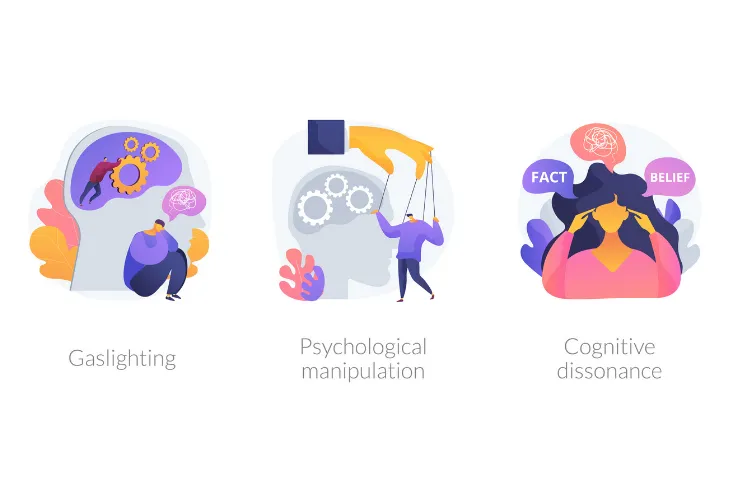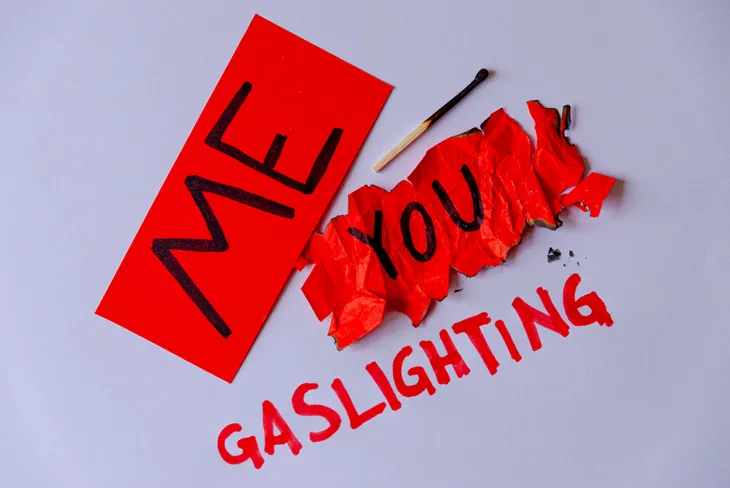- Gaslighting is a type of manipulation that relies on a variety of different techniques designed to exert control over a person.
- Victims of gaslighting experience a lot of self-doubt, insecurity, powerlessness, and anxiety.
- Gaslighting’s various manipulation methods include countering, withholding, trivializing, denial, diverting, discrediting, and lying.
- Gaslighting is a form of mental abuse, and as such, it can really weigh on a person. If you suspect you’re a victim of this toxic behavior, seek help from friends or family members, or a therapist right away.
Navigating the expectations and disagreements associated with meaningful relationships always presents varying levels of challenges. You’re always going to disagree on some things, and feelings may sometimes get hurt. But not all people resolve disagreements in a healthy way, or even at all, and the consequences can be crippling.
Gaslighting, a form of emotional abuse, is as rampant as it is hard to pick up on. Those that use it are often quite good at side-stepping accountability. That said, the gaslighting charade has a wonderful way of falling apart when it meets someone who knows how to confront it.
Today, we’re going to look at this toxic trait so that you know exactly what to do the next time it comes knocking.
What Is Gaslighting?
Primarily manifested in romantic relationships, gaslighting is a type of manipulation that relies on a variety of different techniques designed to exert control over a person. The aggressor uses lies, guilt, denial, and more to create a false narrative for the victim to get them to call into question their emotions, perception, and even sanity.
The term was born out of the 1938 play, “Gas Light” in which a husband attempts to manipulate his wife’s perception to commit her to a mental institution and steal her inheritance. In real life, gaslighting doesn’t play out much differently than the play, with victims experiencing pervasive self-doubt, insecurity, and stress.
Why It Happens
Gaslighting may happen more in romantic relationships, but it’s been used in board meetings, doctor’s offices, and classrooms too. The one constant remains the perpetrator. Those that rely on gaslighting are typically not well themselves. After all, the end goal is to manipulate a person or situation using incredibly hurtful and harmful strategies. It takes a certain type of person to do that sort of thing.
So why does it happen? There are a lot of answers to that question. Maybe the aggressor views you as a threat. Perhaps they suffer from abandonment issues and are willing to take dramatic steps to ensure you never leave. It is important to stress though, that nobody deserves this sort of psychological torture, and it’s never the victim’s fault.
Signs of Gaslighting
Before we break down gaslighting’s various manipulation methods and how they play out in real life, it’s important to establish what being a victim can sometimes feel like. This is a subtle and varied technique, and as such, it can be hard to notice.
Victims of gaslighting experience a lot of self-doubt, insecurity, and powerlessness. They may come to doubt their perception of reality causing them to second-guess just about everything. Feelings of confusion and anxiety are commonplace, as is the need to constantly apologize.
Gaslighting Technique: Countering
Countering is a common gaslighting technique that’s typified by questioning a person’s memories. The gaslighter may look for ways to cultivate doubt in your recollection of past events, or even insert new details that never actually happened.
They may say, “you have such a bad memory,” “that’s not what really happened,” “you’re wrong,” or “are you sure.” The gaslighter will make these claims and in some cases, even add on details that never happened to rewrite history in a way that favors them.
Gaslighting Technique: Withholding
Have you ever tried hashing out a conflict with someone who conveniently can’t grasp your concerns? That’s called withholding and dealing with it on the regular can be incredibly frustrating.
If the person you’re trying to talk to refuses to listen, pretends that they don’t understand where you’re coming from, or accuses you of trying to confuse them, be wary. This destructive trait shouldn’t be ignored and can be a good indicator that they’re gaslighting you.
Gaslighting Technique: Trivializing
Trivializing is easily one of the most toxic gaslighting techniques because of its ability to make the victim feel so darn insignificant. A “trivializer” loves to tell others to calm down or accuse them of being too sensitive.
The goal of trivializing is to gain power by making the target’s thoughts and feelings seem invalid or unimportant. “This can cause the target to begin to believe that their feelings are invalid or too drastic,” explains WebMD.
Gaslighting Technique: Denial
Good luck trying to get a gaslighter to take responsibility for their hurtful actions. Even if your discussion happens to land on a day when they’re willing to pay attention, odds are you aren’t likely to hear an apology.
A popular branch on their decision tree is an outright denial of any wrongdoing. They may pretend to forget events or how they happened or just outright deny that they ever did anything wrong.
Gaslighting Technique: Diverting
There are some days a gaslighter won’t even give you the time of day. Instead of acknowledging your concerns like a well-adjusted human being, they’ll lean on several age-old techniques to try and knock you off course.
They may try to change the subject or distract you with an activity. Accusing you of “getting the idea from one of your friends,” is another frequently occurring example of diverting.
Gaslighting Technique: Discrediting and Lying
There’s no bar that’s too low for a gaslighter trying to skirt accountability. The most ruthless among them will talk about you behind your back, tell your friends that you’re crazy, or just make things up. They may lean on sexist, racist, or ageist stereotypes to invalidate and discredit your concerns as well.
Gaslighters certainly aren’t above telling you outright lies. There are a lot of crossovers between those that frequently gaslight their loved ones and pathological liars. It doesn’t matter if you hold proof of their lies in your hands either. A person that’s turned to telling lies to defend their abhorrent actions is unlikely to back down even when confronted with evidence.
How to Respond
We could write a whole other article on ways to deal with someone that’s trying to gaslight you, but a few quick tips can help too.
The best thing you can do is talk to other people about your situation. Their perspective can help ease your confusion and your stress. It’s probably a good idea to take an emotional and even physical step back from the perpetrator. You may want to establish some firm boundaries too.
Whatever you do, don’t delete the evidence. Work on documenting your experiences, save text conversations, keep emails, and refer to them later whenever you start questioning yourself.
When to Seek Help
Gaslighting is a form of mental abuse, and as such, it can really weigh on a person. If you suspect you’re a victim of this toxic behavior, seek help from friends or family members right away.
Over time, gaslighting may evolve into other forms of abuse including physical violence. At the very least, gaslighting victims may greatly benefit from talking to a therapist with experience in the handling of abusive relationships.
The Takeaway
Gaslighting is a word that’s thrown around a lot online these days. It doesn’t help that defining it can sometimes be difficult. Hopefully, today’s exploration into gaslighting helped you better understand this terribly manipulative behavior pattern.
Remember, your best defense against manipulation is understanding its root cause. If you’re still unsure, keep reading more about gaslighting and what it looks like in real life. Knowing what it looks like may save you or a loved one from a lot of mental anguish.















